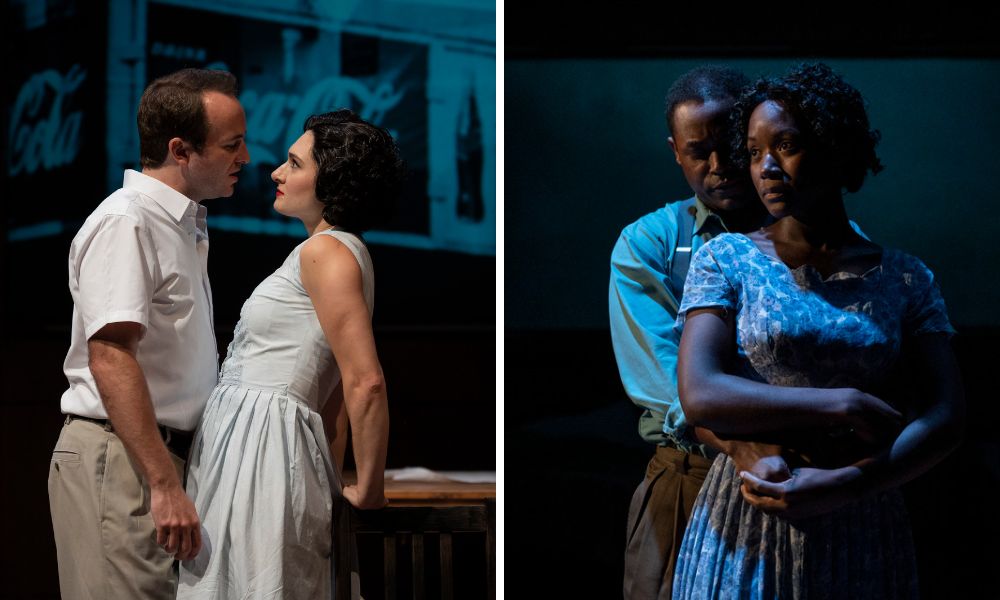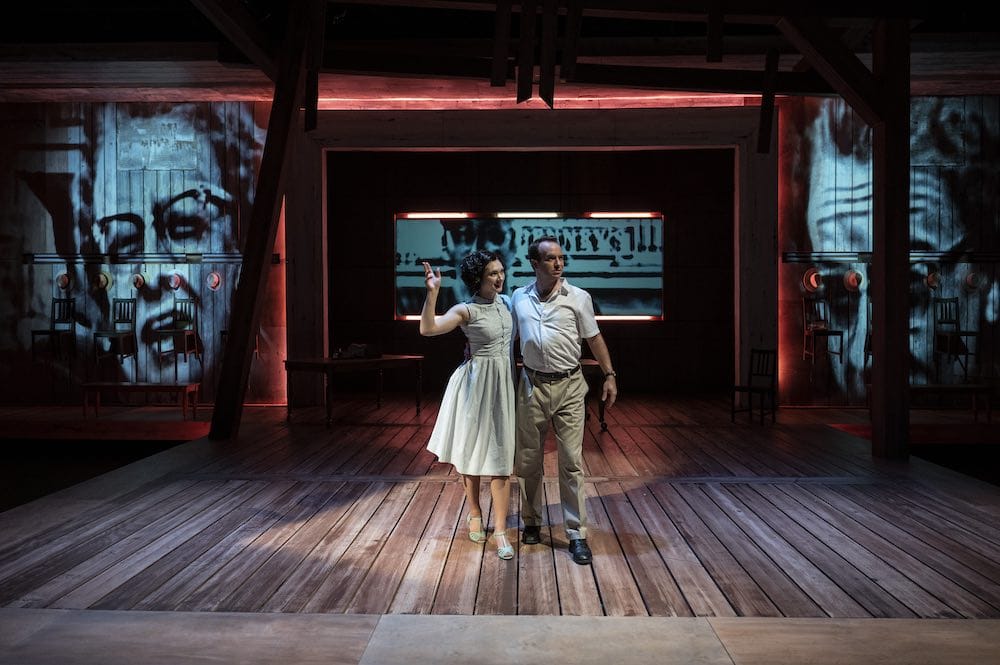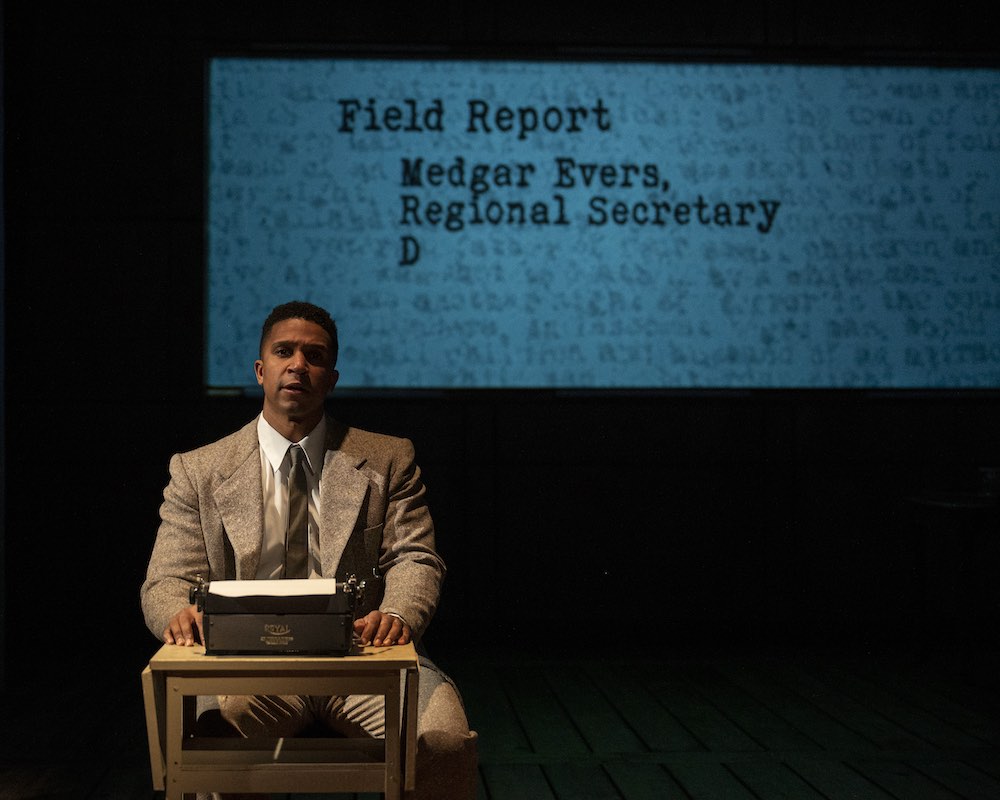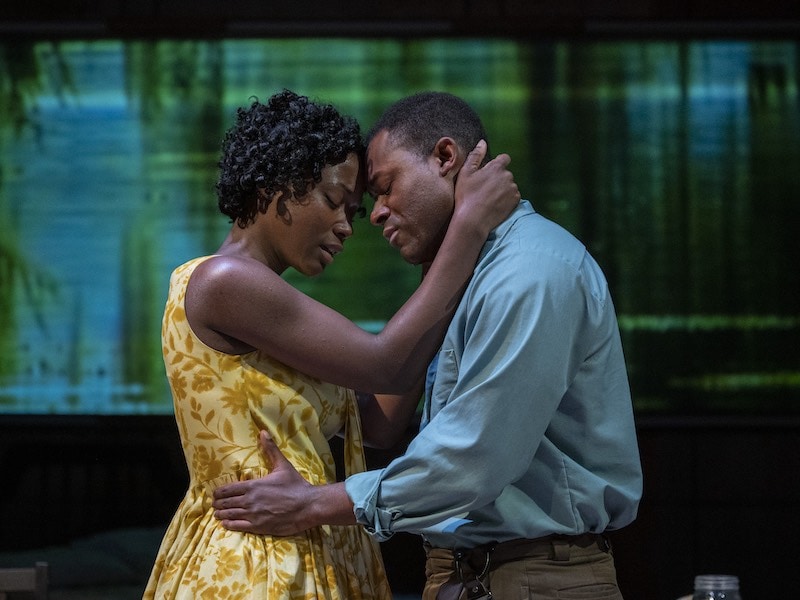There is a futility that is done on the earth: There are righteous men who get what the actions of the wicked deserve, and there are wicked men who get what the actions of the righteous deserve. I say that this too is futile. — Ecclesiastes 8:14
I feel like going on.
I feel like going on.
Though trials mount on every hand,
I feel like going on. — Gospel song
The title of this play, Benevolence, makes you wonder. The acquittal of Roy Bryant and J. W. Milam for the lynching of Emmett Till fueled the sense that violence against Black Americans would never be punished. Roy Bryant and J. W. Milam received $4,000 in payment from Look magazine for an interview in which they confessed they had kidnapped and murdered Emmett Till. Three months after Emmett Till’s murder, Clinton Melton, a Black gas station attendant, was shot to death in broad daylight by a white man who was also implicated in Till’s murder. Melton’s widow, Beulah Melton, drowned when her car ended up in the Black Bayou River just days before the trial for her husband’s murder was set to begin. She was known as an experienced driver.
The definition of benevolence is “an act of kindness or an inclination to be kind.” Why would Ifa Bayeza give her play this name?
In the production of Benevolence now in repertory at Mosaic Theater, Director Talvin Wilks gives us a bravura display of the interplay of movement, sound, and the script’s poetry, to show us how the Emmett Till murder distorted the most intimate human relationships among the people involved: the relationships among lovers, spouses, and family.

In its first act, the play looks at the relationships of white people among themselves. In its second act, the play turns its attention to Black people among themselves.
Caroline Bryant — the instigator of Emmet Till’s lynching — reads True Confessions magazine (“It was wrong to taunt him, to entice him. But the hunger inside her drove her on…”) and is dominated by her husband and her brother-in-law (the twins Roy and Ray Bryant), whose sibling rivalry extends both to vying for her sexual attention and to dominating her. These behavior patterns feed directly into Roy Bryant’s urge to defend his manhood and superiority by brutalizing and murdering a Black boy who is reputed to have insulted his wife. After the lynching, as attention and pressure begin to mount, Caroline’s brother-in-law confronts her:
Ray: That’s right, stick to the story: True Confessions.
Caroline: I am not in this.
Ray: You the fuckin’ main event, sistuh. You got the whole damn fam’ly mixed up in yoah shit… Made international news… Cuz you was what? Bored? Jealous?

In the second act, we see the family of Clinton and Beulah (“Bea”) Melton struggling with how Clinton’s infidelity is affecting their marriage. Vaughn Ryan Midder’s Clinton Melton is an imperfect man who in a pinch you’d still trust, given what else the world has to offer. Billie Krishawn’s Beulah is grounded in clear-eyed reality. When they first meet at a dance, Clinton says, “When I look at you, I forget what I was gonna say.” Beulah replies: “Then close your eyes. Now you want beans or greens, Mr. Melton?” Director Wilks has excellent collaborators in his actors. Through their voices and enunciation, they manage to make the words of the script an almost concrete presence. Lena Horne — herself a southerner — once noted that a southern accent “sticks to the roof of your mouth.” Anna DiGiovanni (as Caroline Bryant) and Scott Ward Abernathy (as Roy/Ray Bryant) — in accents that seemed to me specifically Mississippian, not merely generically Southern (Jen Rabbit Ring, dialect coach) — deliver lines about everyday things with a percussive brutality that sticks in the ears of the hearer:
Caroline: You shoulda gone steada Roy… Or let Leslie and him go together. Two of you coulda drove straight through…
Ray: You got a nerve to fix yoah mouth. You the one missed the window… Think the world here to do fuh you.

In contrast to the brutality of the Bryants’ language, Jaysen Wright’s NAACP worker Medgar Evers delivers his lines in a way that is precise and controlled in both diction and passion. He assesses what is needed by the unheralded people he interviews, giving them space:
Evers: I’ve just left the wife of Clinton [Milton], talked with her briefly. She was… How are you feeling, Mrs. Melton?
Bea: Not too well.
Evers: She’s disturbed emotionally and is in the bed… Mrs. Melton, may I call you Beulah?
Bea: Beulah. Or Bea?
Billie Krishawn plays Bea Melton in Benevolence. She also plays Mamie Till in The Ballad of Emmett Till and That Summer in Sumner. Embodying the image of mother throughout the three plays, Krishawn’s portrayals become an almost mythic presence. Every line she says seems to come up through the ground before it comes out of her mouth. In Benevolence, she moves from being delusional paranoic — the result of the combined traumas of both her husband’s death and the constant atmosphere of terror — to attentive and caring mother in an instant.
The exploration of the abundant metaphors in the spectacle of Benevolence begins with the set. There are three screens across the upstage wall that serve as windows into the characters’ world. Before the play begins we see motion picture images of African Americans engaged in activities of daily living in the 1950s projected onto the screens: facades of grocery stores and gasoline stations. Notably, we see children joyfully discovering things such as ice cream. During the play itself, we are shown images of storm clouds and the swamp that surrounds the neighborhood with its dark waters into which Emmett Till’s body was submerged and in which Bea Melton’s body will drown.
All of the action is staged on a heavy wooden platform that is outlined by a broken framework of the house the characters live in. The wooden floors of the rooms that these people live in squeak. You see light through the joints in the floorboards. As furniture is moved across the floor we hear and feel it rumble across the floor. We get the feeling that this space where the action takes place is a house that is “haunted” by the evil and terror that surrounds it. Though the same set is used for all three plays, Benevolence takes more time than the others exploring the metaphor the set presents us with. As costume changes are made in full view of the audience, we see and hear the rough, unglamorous, and unhurried sound of cloth pulling across cloth: keeping us aware of the heat and threat of bodies in the South. And the feeling of the house being haunted is further enhanced when both Bea and Clinton Melton have conversations with their children, who are not physically present. These conversations begin as the familiar theatrical convention of pantomiming objects and people that are not actually there. But they eventually shift into something else as Bea’s dissociation becomes more pronounced.

We hear the words of the script but we also hear the sound of a train whistle at the beginning of the play. This train whistle becomes a psychic extension of the whistle that Emmett Till is said to have made at Caroline Bryant in the Bryants’ store.
Rolonda Watts plays two widely divergent roles. One is the 9-year-old Mary Johnson, a neighbor, who is up inappropriately late at night conversing with Clinton Melton and waiting to help her father to get home after he’s gotten drunk. The other is Delores Grisham, the 65-year-old offspring of Beulah Melton and Clinton Melton who survives the suspicious drowning/suicide attempt in the car that Beulah is driving. Rolonda Watts is remarkably versatile in all of the roles she plays throughout the Trilogy. For the role of Mary Johnson, Watts wears a dress (Danielle Preston, costume designer) that transforms her mature body into a pre-adolescent body, shifting her waist and leg positions. Watts then imbues Mary Johnson with the logic and tongue of an adolescent who is selectively unfiltered. Talking of a white man whose attentions Johnson had to elude, Clinton Melton interrogates her:
Melton: You sass him like that?
Mary: I ain’t crazy. In my mind.
The first act inquiry into the lives of white people in the aftermath of Emmett Till’s murder ends with Caroline Bryant engaging in a ritual of banal normalcy:
(Caroline, the beauty queen, walks downstage, stepping gingerly across the tracks. As she reaches the lip of the stage light, she stops.)
Caroline: Morning, Mrs. Faulkner… May I come in?
The second act examination of the Melton family in the aftermath of Till’s murder ends with a series of memories and reconstructions:
Delores: I remember every detail of the house we lived in… The kitchen had a window we could look out… We used to watch that bridge and see him come across the bridge there… First one he picked up was my sister Vivian. Then the rest of us got a pick-up and a hug.
The effect of the Emmett Till murder on this Black family is unsurprising. It is suffering both physical and psychic. In addition to what is a matter of record — Clinton Melton’s killing at gunpoint and Beulah Melton’s suspicious drowning in the swamp — the legacy of Till’s murder and the atmosphere it fostered encouraged the development of the gaps in connection and knowledge among the Melton family:
Delores: Had another brother didn’t know where he was. This lady a long time ago told me. Another brother and a sister. I got a sister that’s 62 years old. They should have told us before now. We coulda had all this time together.
The first act of Benevolence may leave you enraged and/or ashamed. I remember seeing some audience members leaving before the first act had ended. My guest for the evening said that had there been a talkback after that first act, he would not have wanted to have participated if white people had been in the room because he would not have been willing to censor his thoughts or his words.
The second act left us both in a different place for which I do not have the words. Unless that word is benevolence.
Running Times:
The Ballad of Emmett Till – 90 minutes no intermission
That Summer in Sumner – 105 minutes, 15-minute intermission
Benevolence – 120 minutes, 15-minute intermission
Benevolence is part of The Till Trilogy, which plays in repertory through November 22, 2022 — on Wednesdays at 8 PM, Thursdays at 11 AM and 8 PM, Fridays at 8 PM, Saturdays at 3 PM and 8 PM, and Sundays at 3 PM — presented by Mosaic Theater Company performing in the Sprenger Theatre at Atlas Performing Arts Center, 1333 H Street NE, Washington, DC. For the schedule and to purchase tickets ($29–$64), go online or contact the Box Office at (202) 399-7993 or [email protected] from 11 AM – 5 PM Monday through Friday, or two hours prior to a performance.
The program for The Till Trilogy is online here.
COVID Safety: All patrons are required to be masked while inside performance spaces. The use of N95 masks is encouraged. Masks may be optional in other areas of the building, including lobbies. The complete Atlas Performing Arts Center COVID policy is here.
Benevolence
Written by Ifa Bayeza
Directed by Talvin Wilks
Cast: Scott Ward Abernethy (Ray/Roy Bryant), Anna DiGiovanni (Caroline Bryant), Christopher Genebach (JJ Breeland, defense attorney), Drew Kopas (David Killingsworth, FBI Investigator), Billie Krishawn (Beulah “Bea” Melton), Vaughn Ryan Midder (Clinton Melton), Rolonda Watts (Mary Johnson, Delores Grisham), Jaysen Wright (Medgar Evers)
Creative and Production
Scenic Designer: Andrew Cohen
Lighting Designer: Alberto Segarra
Projection Designer: Mona Kasra
Costume Designer: Danielle Preston
Sound Designer and Composer: Kwamina “Binnie” Biney
Associate Sound Designer: Dominique Perera
Vocal Arranger: Paige Rammelkamp
Additional Arrangements and Music Direction: Rickey Payton, Sr.
Properties Designer: Deb Thomas
Fight and Intimacy Director: Sierra Young
Dramaturg: Faedra Chatard Carpenter
Dialect Coach: Jen Rabbit Ring
Assistant Director and Choreographer: Sandra L. Holloway
Stage Manager: Shayna O’Neill
SEE ALSO:
‘The Till Trilogy’ at Mosaic Theater is beautiful, haunting, and horrifying (overview review of the trilogy by Gregory Ford, October 20, 2022)
Brutality and transfiguration in ‘The Ballad of Emmett Till’ at Mosaic Theater (review by Gregory Ford, November 3, 2022)
Elusive truth and justice in ‘That Summer in Sumner’ at Mosaic Theater (review by Gregory Ford, November 7, 2022)




